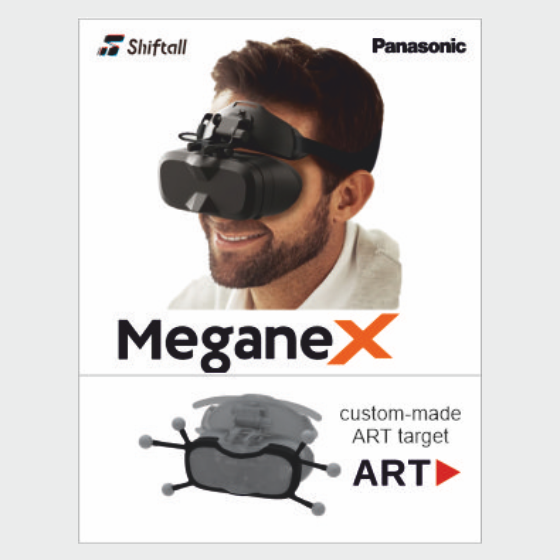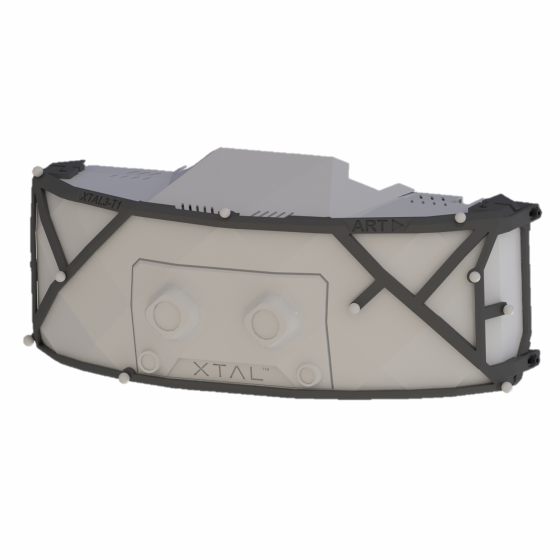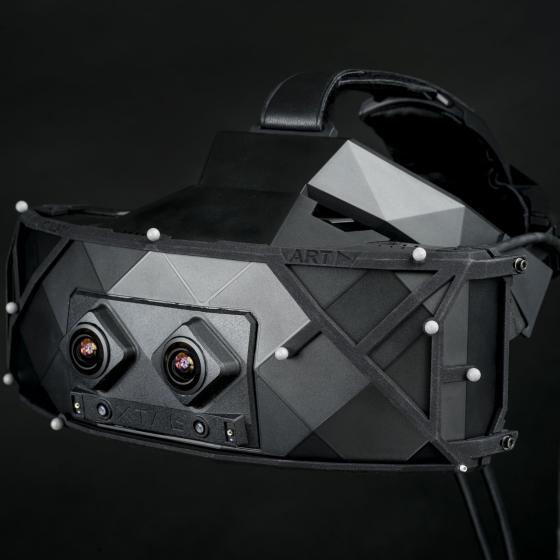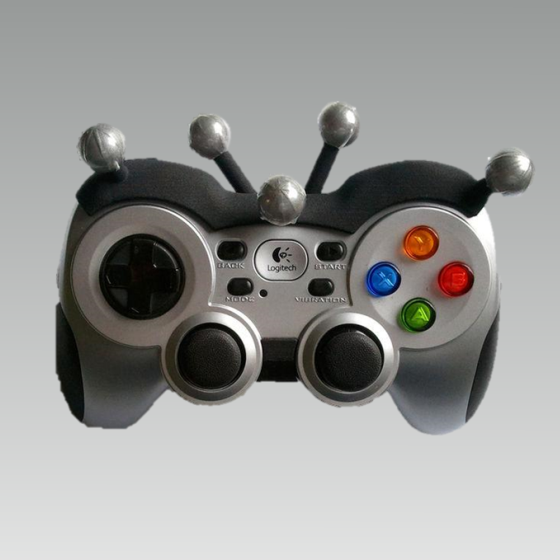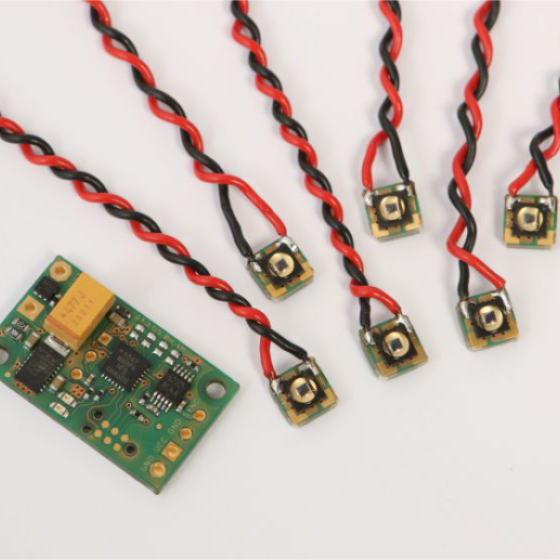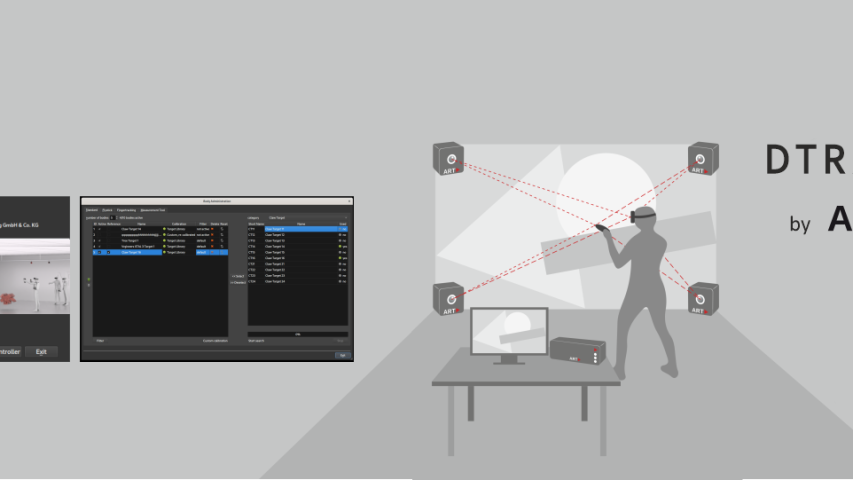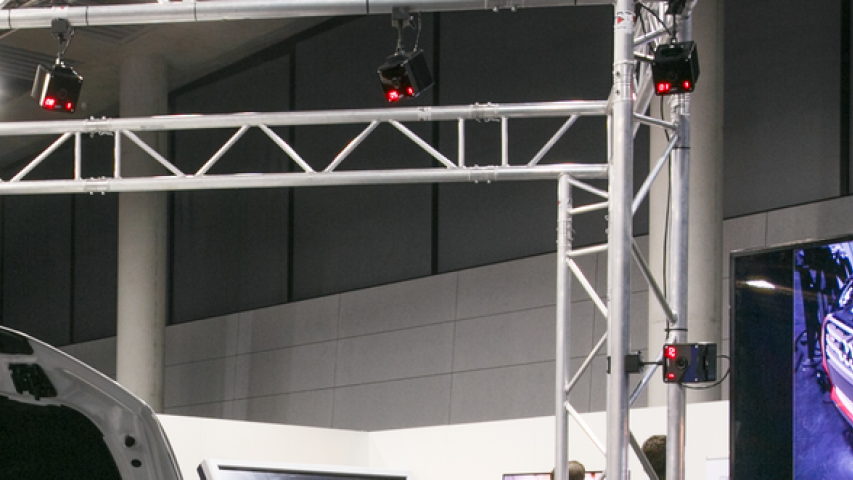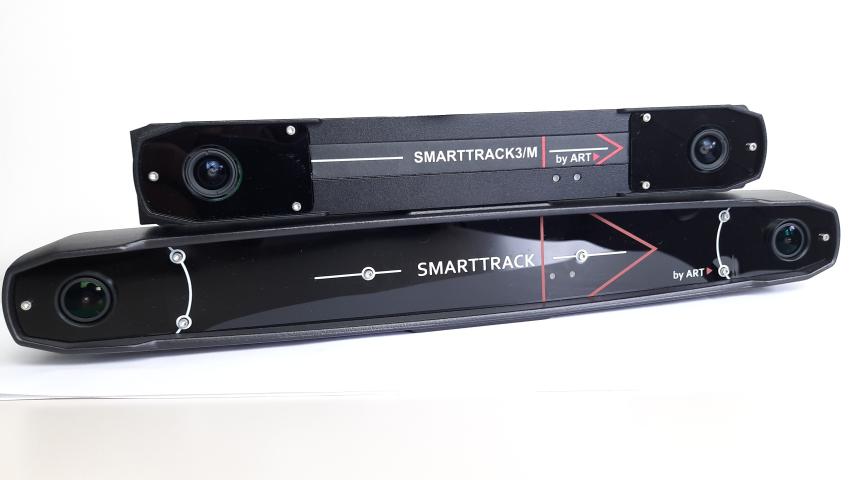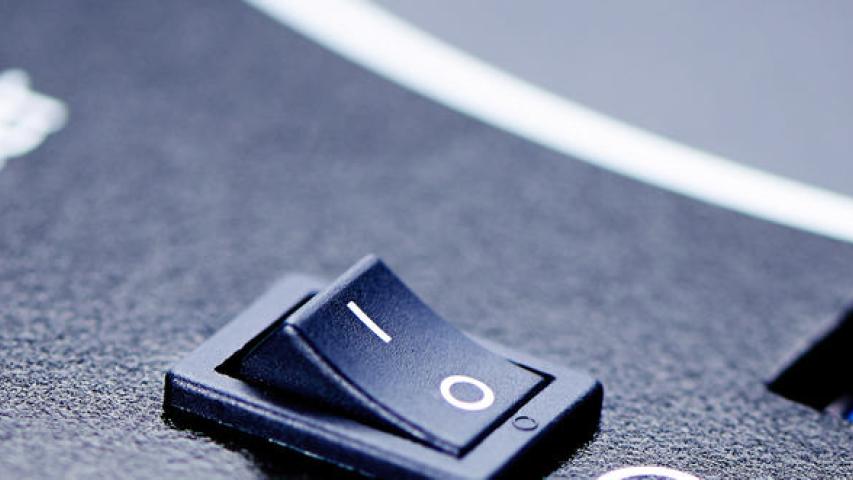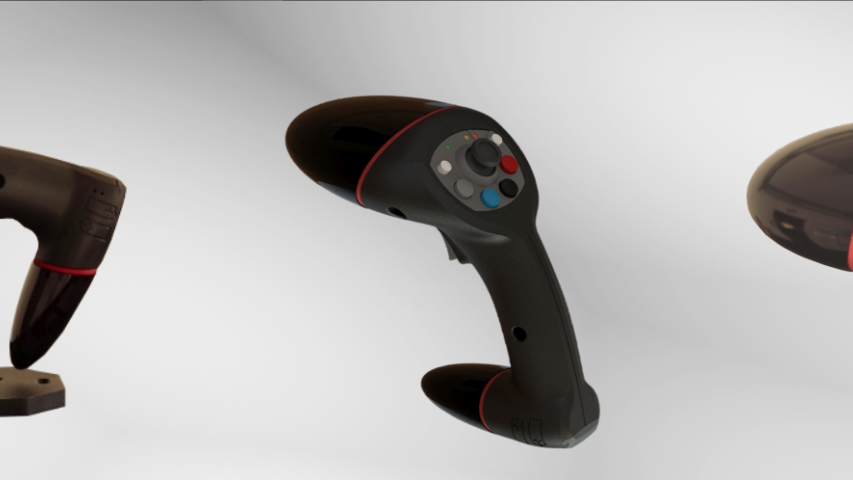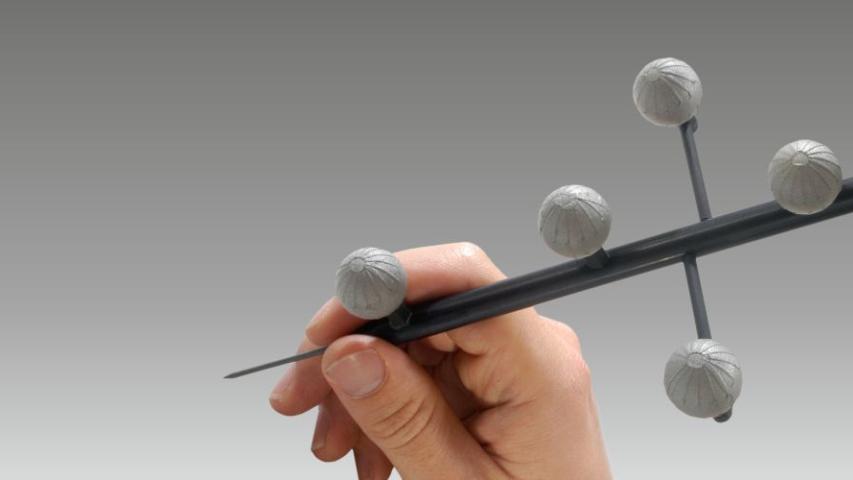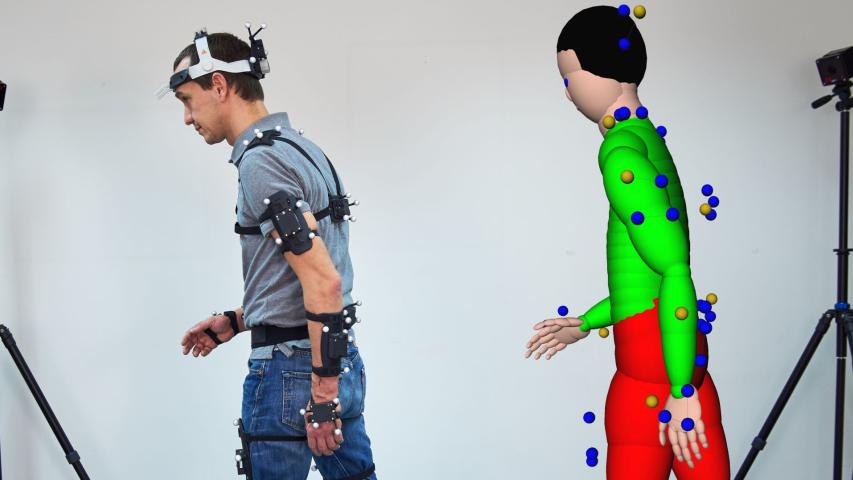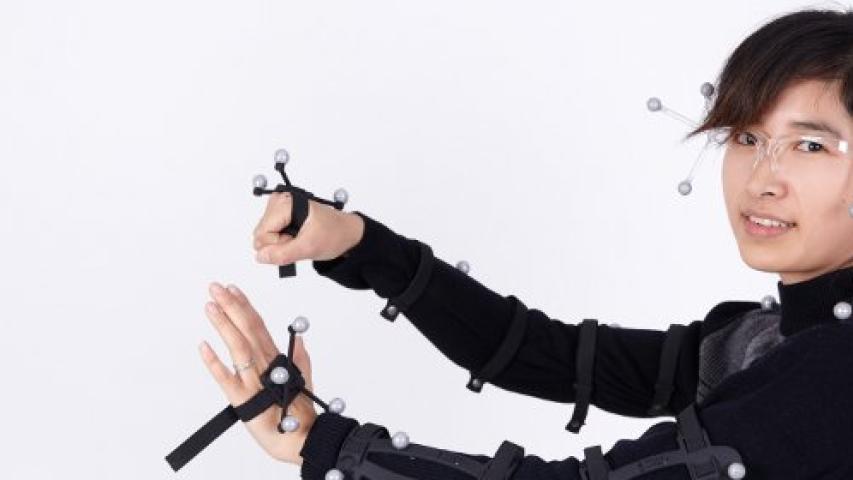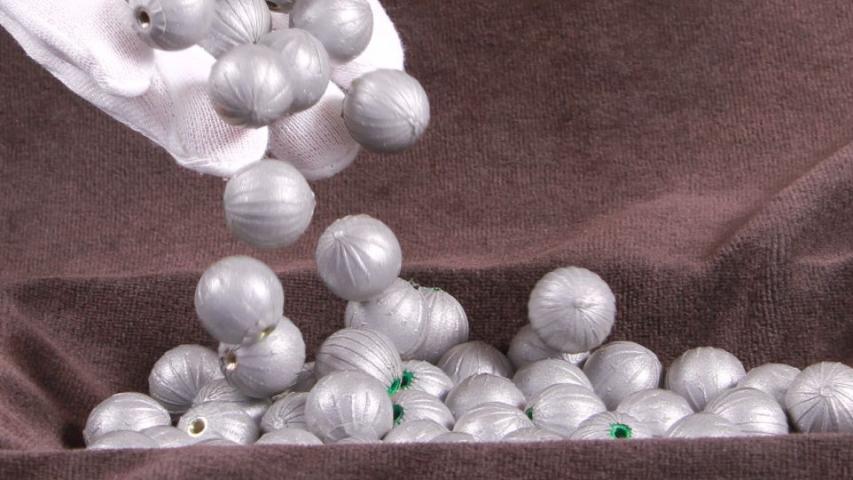Many geometries, also customized
Targets consists of several markers (minimum 4), and will give the 6DOF (degrees of freedom). Here also, we distinguish between passive and active types. In addition to our standard targets we offer several construction sets for your own targets and customized developments.
Passive glasses targets
For head tracking in passive or active stereo systems, tracking targets must be affixed to the stereo glasses. ART offers lightweight standard targets as well as several adapted targets (e.g. clip-on) for a range of commercially available stereo glasses.
For some glasses brands we offer the smaller and less obtrusive target geometry 8 (e.g. XPT8) additionally to the bigger, function optimized geometries 4 to 6.
The Technical Datasheet (see download section below) shows an overview of our available targets in different geometries.
Passive GENERIC targets
Hand target
The hand target is designed for hands and elbows in usability/assembly studies. It is also frequently used as a small general-purpose target. Available models: HT23, HT25, HT26, HT27, HT29 through HT32 .
Claw target
The claw target looks just the same as the hand target, but comes in a bigger size and is equipped with bigger markers. Available models: CT11 through CT16.
Large hand target
This hand target is designed for hand tracking in a two-camera tracking system. Its large size allows the user to make almost any movement with the hand without producing any occlusions. Available models: LHT1 and LHT2.
Tree target
Originally designed for tracking HMDs, the tree target is a general-purpose target for tracking from longer distances (see picture above). It is equipped with 20 mm markers. Available models: TT1 through TT5.
Motion Capture target set
The ART Motion Capture set allows the precise recording of body movements. This is achieved by using 17 individual 6DOF targets which are attached to various parts of the body. This is very flexible in use because only the targets needed for the specific Motion Capture task need to be worn. For example, in a seating buck setup we use a subset of targets to track only the upper body, head and arms. The system is capable of tracking two people with full body tracking simultaneously, while a third subject’s upper body can also be tracked at the same time. The individual reflective markers have a tough plastic coating which makes them extremely resistant to the scratches and other minor damage that can be caused by rough working environments.
For more information also see our Motion Capture page.
Targets for HMDs
HMDs deliver a high immersive mixed reality experience, especially in combination with ART optical tracking, through which increased accuracy and stability, no drifts and substantially reduced jitter offer an enhanced "close to reality" experience. HMDs are ideally suited for in-car tracking applications.
ART HMD targets for Varjo, XTAL HMDs or the MeganeX Superlight 8K already exist. Any other geometry can be built on request.
See also our ART and HMDs page.
Customized targets
In addition to our standard target collection, we specialise in creating non-standard targets customized to your specifications, varying size or radiant power, using passive or active markers. If you have special requirements regarding the target design, we can help by developing an appropriate rapid prototyping layout.
Target for Logitech Gamepad F710
As a special solution for gaming applications we designed a target for the Gamepad by Logitech. Of course it can be adapted to other Gamepad geometries.
Robust Passive Targets
To track objects (e.g. tools) in industrial environments, targets have to be lightweight and robust. They should be inconspicuous and must not disturb the operators in their activity. With a target attached to both a tool and the processed object, the user can get all relevant information like position and rotation. A target can be designed with passive (ring) markers or active LED diodes.
A robust passive target uses laminated spherical markers. With the lamination the worker can touch it and it can be cleaned without damaging the reflection film. The geometry is bigger than an active target but no power supply is necessary.
Self-made targets
Self-made targets allow for the flexibility which developers and researchers need for testing purposes. Upon request ART provides the corresponding material for passive and active targets, such as retroreflective foil or electronics.
If you want to build up your own targets, you have to apply only a few simple rules:
- A target consists of at least 4 markers in a fixed constellation.
- The minimum marker distance within a target should exceed 4 cm for spherical 12mm markers (center to center), or 3.5 times marker diameter for other spherical markers.
- The distances of all two marker pairs in a target should differ by at least 3 mm. The same is valid from target to target.
Should you want to track more than one self-made target in your setup, there are additional aspects you have to consider:
The difficulty of creating self-made targets for one tracking setup increases with the number of targets.
The marker distances within a target serve as a key to identify that target. More precisely, any subset of 4 markers and the corresponding marker distances are enough for identification. Any two targets with similar marker constellations will not be distinguishable and risk being incorrectly identified. This becomes a more and more complicated problem the more targets you want to use. The risk in constructing a new target is that, without knowing it, you may create a constellation of markers which is similar to one of the precalculated ART targets.
A self-made target may not work together with standard or future ART targets.
If you want to use your self-made targets together with standard ART targets, we can help by checking for dangerous similarities between both target sets. Please note that currently we do not offer calculations to check for similarities within the set of your self-made targets. If you need a large set of targets, purchasing our precalculated ones will ensure that the problem of similarity within a set does not occur.
Origin location and coordinate orientation for all 6dof targets can be set in DTRACK’s ‘Body adjustment’ menue. This is a useful feature for self-made targets First carry out body calibration for your new target, then adjust coordinates by using ‘Body adjustment’. Especially useful is often the button ‘adjust axes to room’ in combination with ‘use tracked orientation’.
Active Targets
Fingertracking
Our Fingertracking targets use small and robust active markers, allowing a compact design with higher wearing comfort than the gloves you typically find in VR setups.
ART Fingertracking
Robust active targets for tools
An active target will be designed individually for each customer and tool, in order to make it perfectly fit to the geometry of the tool. The power supply can be directly sourced from the screwdriver. The target design ensures that it can be tracked in nearly every position.
AMC6 board and marker set
Our AMC6 board with active markers is a DIY set for building your own active target. It can control up to 6 single LEDs, is powered by battery or USB, and is synchronized with the tracking cameras by wired or IR sync.














